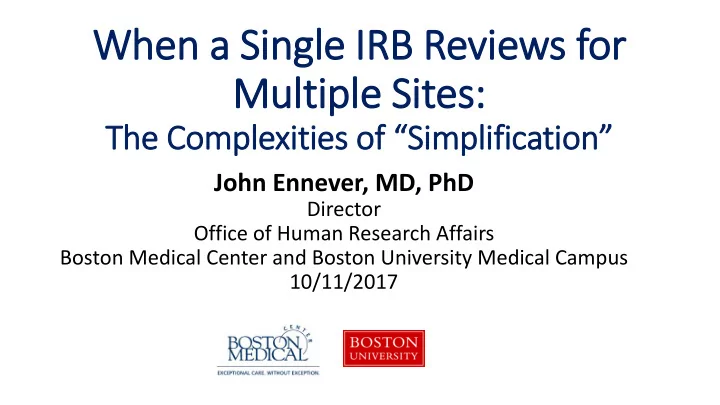

When a Single IR IRB Reviews for Multiple Sites: The Complexities of “Simplification” John Ennever, MD, PhD Director Office of Human Research Affairs Boston Medical Center and Boston University Medical Campus 10/11/2017
Learning objectives • Identify when the use of a single IRB is required for multi-site research and when it is optional • Explain the obligations of investigators under a single IRB review • Understand that consultation with the BMC/BU Medical Campus IRB is required when an investigator is the lead on a study that is required to have a single IRB 2
Nomenclature • Cede : the process by which one institution agrees to rely on another entity for IRB review • Single IRB (sIRB): the one IRB that reviews for a multi-site study • Relying institution : the institution where research takes place that is reviewed by a different IRB. • Reliance Agreement : the agreement between the relying institution and the sIRB 3
Nomenclature • Local PI : the Principal Investigator at the relying institution • Lead PI : the overall Principal Investigator, who acts as a liaison between local PIs and the single IRB • Multi-site study : a study using the same protocol at more than one site 4
When is sIR IRB Review Required? NIH funded multi-site studies • All studies with a receipt date for competing grant applications (new, renewal, revision, or resubmission) on or after January 25, 2018 Other federally-funded multi-site studies • January 19, 2020 5
Advantages • The protocol is only reviewed once • The sIRB may have more leverage with sponsors to require changes • The Lead PI submits amendments and continuing reviews on behalf of the local PIs 6
Disadvantages (I (I) • Requires coordination between relying institution and sIRB for o Local context review (e.g., Massachusetts’ laws) o Local signoffs (e.g., nursing, radiation safety) o Local investigator requirements (e.g., training, CoI) o Local recruitment requirements (e.g., non-readers) o Local consent form requirements (e.g., injury, cost) o Post-approval monitoring (e.g., audits) 7
Disadvantages (I (II) • Requires Lead PI to communicate with all Local PIs regarding o sIRB submission requirements for initial and continuing review o sIRB determinations o Consent forms o Recruitment materials o Reporting requirements 8
Disadvantages (I (III) • Requires Local PI to know and follow sIRB requirements for o Process for providing information to join the study (e.g., the format required by the lead PI) o Continuing review and closure reports o Reporting on Unanticipated Problems, protocol deviations, etc. (e.g., definitions, timeframes) 9
Version 1.6 5/4/16 Algorithm for Reporting Unanticipated Problems, Adverse Events, and Deviations Adverse Incident, experience, Event or or outcome Protocol No report Serious no no Deviation required Adverse Event Unexpected given no known risks yes to subjects yes MAJOR yes Report to IRB Protocol at Continuing Review Deviation no Related or no (risk to Attach to Progress Report: possibly related subjects If have DSMB report to participation or data) • attach to Section 4 Otherwise, yes • attach AE/SAE/Minor yes deviation summary Suggests greater to Section 5 no risk of harm to subjects or others Submit on Reportable Events and New Information form within 2 days if fatal or life-threatening event yes within 7 days otherwise
Im Implications – Lead PI PI When you are a Lead PI • Consult with us as soon as you know you must use a single IRB • Identify local PIs and make sure they know how their institutions will cede • Budget for: o Adequate staff to liaison with local sites o IRB review costs • Learn to use SMART IRB 11
SMART IR IRB SMART IRB ( not an IRB) • Electronic platform for reliance agreements • Includes exempt human subjects research • 297 participating institutions, including all 64 CTSAs • Working to promote harmonization among IRBs Possible to cede outside of SMART IRB, but requires legal review of the agreement 12
Im Implications – Local PI PI When you are a Local PI • Find out from Lead PI how to learn requirements of sIRB • Submit to BMC/BU Medical Campus IRB through the cede review path in INSPIR 13
14
Additional In Information in IN INSPIR • Special routing o Use of local facilities o VelosCT Same as all • Study personnel submissions • Drug/device information o Storage o Drug preparation and dispensing 15
Additional In Information in IN INSPIR ( con’t ) • Identification of the single IRB • Special populations o students/employees o wards o cognitively impaired o non-English speakers o limited- or non-readers • Consent form “Compensation for Injury” language 16
Continuing Obligations of f Local PI to BMC/BU Med Campus HRPP • Study personnel changes o First submit through INSPIR (so we can check training and Conflict of Interest) o Then submit our approval letter for change to sIRB • Internal Unanticipated Problems o Submit simultaneously to sIRB and through INSPIR (so we can start any needed action) 17
Continuing Obligations of f Local PI to BMC/BU Med Campus HRPP ( con’t ) • QA Reviews (not-for-cause audits) o Cooperate with QA review o Assist QA review team with accessing sIRB reporting requirements 18
Continuing Obligations of f Local PI to sIR IRB • Report study personnel changes after BMC/BU Med Campus IRB approval • Obtain documentation of sIRB approval of amendments (including revised consent forms) • Follow sIRB reporting requirements 19
Key Points • Being the PI on a multi-site study adds additional layer of responsibility • Being an investigator on a ceded study requires following the policies of the reviewing IRB and the BMC/BU Med Campus IRB • sIRB has significant advantages but does not make life simple, just different 20
Thank you! 21
Recommend
More recommend